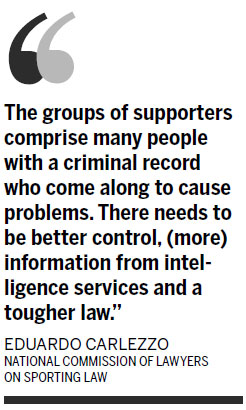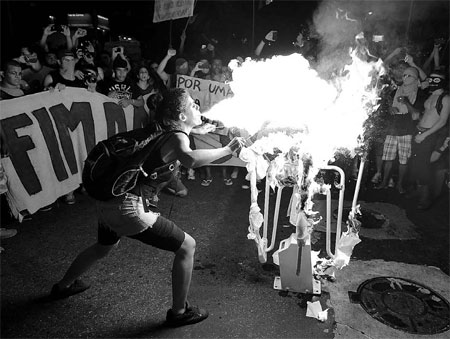Violence stains Brazil's love affair with soccer
Updated: 2014-02-16 08:38
By Agence France-Presse in Sao Paulo(China Daily)
|
|||||||
The dark side of fan loyalty has become a major problem
Brazilians famously love soccer. But sometimes fanaticism goes overboard and violence results, as recent outbreaks of hooliganism and a fan attack on players attest.
Last December saw one of the worst incidents of hooliganism in years when fans of Atletico Paraense clashed with visiting Vasco da Gama.
Television footage showing fans attacking each other flashed across the globe, focusing on one bloodied man being mercilessly kicked in the body and head.
That violence was all the more shocking because it came just six months before Brazil stages the World Cup.
President Dilma Rousseff reacted sternly by insisting such behavior would not be tolerated, but last weekend Brazilian fans were again in the news for all the wrong reasons after dozens of Corinthians supporters invaded the club's training complex and attacked players.
They threatened to break the legs of at least two players and grabbed Peruvian striker Paolo Guerrero around the neck.
Former AC Milan striker Alexandre Pato, one of those targeted for poor recent form, promptly left the club to join Sao Paulo.
Brazilian 'ultras' - hardcore fans - may not have the reputation of English hooligans of yesteryear or Argentina's feared "barrasbravas," but soccer violence directly cost a reported 30 lives last year in the giant country.
"Fighting is a consequence of having to defend our colors," said one Corinthians fan, Alan Mateos, 25.
Mateos is a veteran member of the club's "Gavioes da Fiel" (Hawks of the Faithful) supporters' group that numbers more than 100,000, one of Brazil's biggest fan organizations.
Mateos is easily recognizable with his bare chest and a body covered with tattoed slogans and club badges.
On the terraces members make their intimidating, high-adrenaline presence felt amid a torrent of drum beating and chanting - insults directed at rivals.
'Criminal records'
"Defending Corinthians is our passion. We are always there, at every match," said Gavioes' "chairman" Wagner da Costa.
Asked if he expects to see fan violence during the World Cup he said flatly: "We are Corinthians before Brazilians."

In seeking to rationalize hooliganism, da Costa said there is "a problem in society" and soccer is just one facet of violence in the country as a whole.
"When we go to a disco in the suburbs there are more fights than there are in the stadium," he said.
Eduardo Carlezzo, who sits on a national commission of lawyers on sporting law believes fans will put aside tribal club loyalties at the World Cup and get behind Brazil.
At the same time, Carlezzo identifies an evident correlation between soccer and people with a predisposition to violence.
"The groups of supporters comprise many people with a criminal record who come along to cause problems," said Carlezzo.
He said a supporters statute passed in 2003 providing for hooligans to be fined and slapped with jail terms of up to three years is not enough.
"There needs to be better control, (more) information from intelligence services and a tougher law," he warned.
But others say legislation will not provide an answer to the fundamental problem.
"Repression alone will not resolve the issue," said Bernardo Buarque de Hollanda, professor at the Getulio Vargas research foundation and an author of works on soccer fanaticism.
"At first sight, you think this is just about young men from the suburbs struggling to hold down a job with low educational attainment and low social aspirations," de Hollanda said.
But he asserts that making such generalizations could lead to risky conclusions.
"I know several leaders of radical fan groups who have university degrees and who live in Rio's South Zone, which is the posh end of the city," he said.
|
A girl spits flammable liquid on a bus turnstile set on the street in protest against increased bus fares in Rio de Janeiro last week. Anti-government protests have hampered Brazil since last June, hitting their peak when 1 million citizens took to streets on a single night, calling for better schools and health care and questioning the billions spent to host this year's World Cup and the 2016 Olympics. Leo Correa / Associated Press |
(China Daily 02/16/2014 page11)
